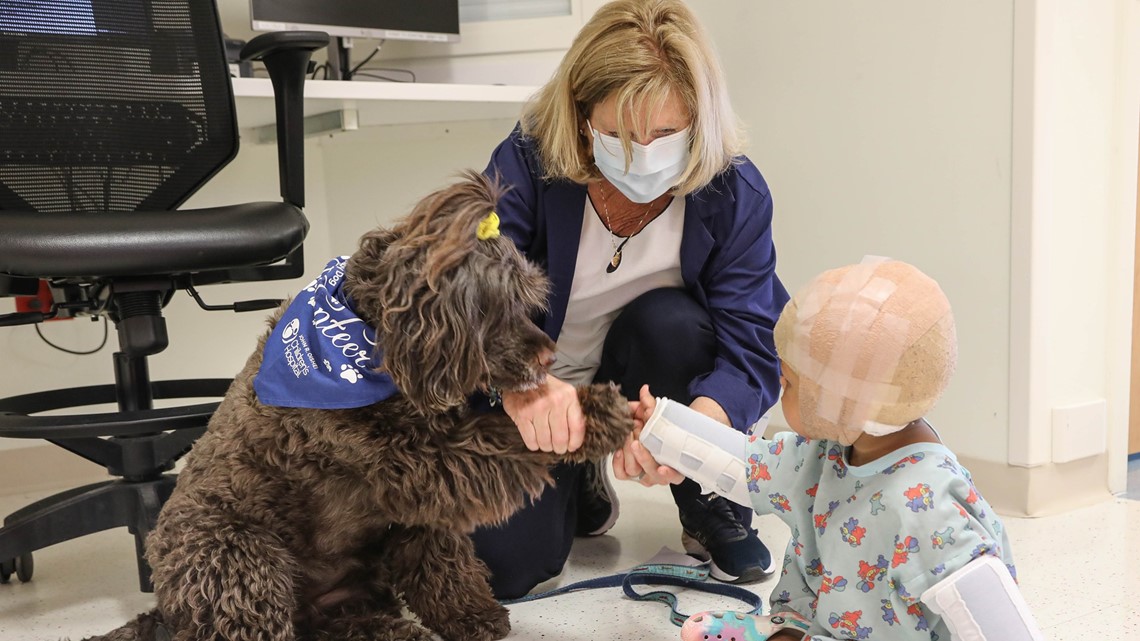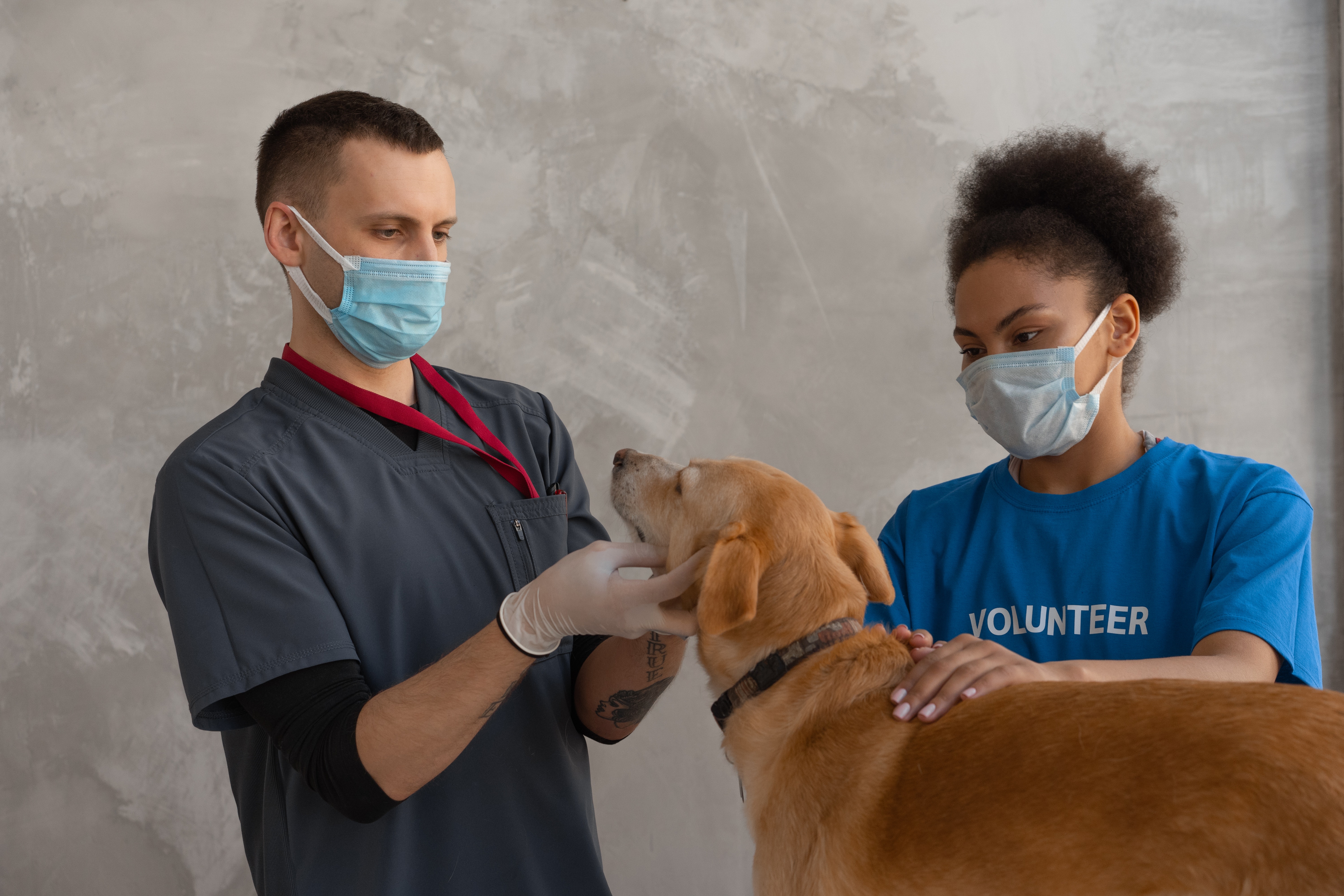
Many of you may already be familiar with the term “therapy dogs” as dogs are trained to provide comfort to individuals in different kinds of facilities like hospitals, schools, retirement homes...etc. These dogs have a naturally good and balanced temperament, they are easy-going, affectionate, and patient. A type of therapy dog that you may not know about is the so-called “facility dogs”.
What are Facility Dogs?
Facility dogs are a type of therapy dogs trained to provide certain services and exhibit a certain behavior that will suit the needs of the facility. They have to be trained in obedience skills and be under the control of a handler during the “working” process. Facility dogs should be trustworthy and able to behave properly in professional environments. These canines can be trained to recognize and respond to up to 40 commands or more, depending on the facility’s needs and requirements.
A facility dog should be able to show basic obedience skills by responding to commands given by hand and/or voice for: staying, sitting, lying down, walking calmly near the mentor, and coming to them when they have been called.
Facility dogs can be trained to perform tasks for the benefit of children as well as adults. They can collaborate with individuals who are a part of rehabilitation on psychiatric programs, as well as with seniors in care facilities, and help them deal easily with different tasks on a daily basis.
A typical feature of the work conducted by a facility dog is the cooperation with a therapist, psychologist or mentor, social worker or other facility staff, who take care of the dogs and monitor the dog’s behavior.
What Can Facility Dogs Do?
Considering the definition of “facility dogs” listed above, it is not a surprise that these dogs need to comply with the requirements in the certain facility, i.e.: if they “work” in a senior care center, they may be trained to retrieve objects needed by the seniors in their daily life;
If they work in a hospital, they may motivate people to participate in physical therapy after an incident and support their mobility improvement through actions like attaching or removing the dog’s leash/collar/vest or taking a piece of kibble with fingers. Walks with the dog are also very beneficial for the patient’s mobility functions. Activities like playing with a ball (taking/throwing/kicking the ball) or holding the dog’s leash have a positive effect on mobility skills and recovery.
If engaged in rehabilitation centers for people with mental disorders, these dogs may help the patients to take part in social activities and feel comfortable and safe in social situations.
A lot of patients enjoy petting, grooming, and playing with these canines, which has a positive effect on their emotional state and reduce the recovery time. Facility dogs can be trained to put their head or chest on the patient’s lap or to lie next to them in order to reduce emotional pressure.
When engaged in the educational system, facility dogs can calm down students and reduce stress during the learning process. Furthermore, these canines can motivate students to participate in learning activities and courses.
Facility dogs can be very helpful for the improvement of the speech skills through activities like reading to the dog, giving the dog verbal commands or trying to remember and repeat facts about the dog like his/her name or breed.
As mentioned above, these dogs are under the control of the facility staff and an important part of their work is to encourage the patients to trust in their doctor’s / therapist’s skills and feel more comfortable with them.
Facility dogs may be brought even in courthouses for providing comfort and companionship to people, who tend to be more vulnerable. Of course, the dogs should not interrupt the proceeding.
In general, we can say that facility dogs need to be trained in basic obedience skills and specific behavior according to the facility’s needs where they work.
Are Facility Dogs Service Dogs?
You may wonder if facility dogs are service dogs?
Service Dogs are individually trained to perform specific tasks for the benefit of people with different types of disabilities. Although the work that facility dogs do needs to be adjusted to the specific needs and regulations of the facility, in general, they are trained obedience and specific behavior. This means that they are not trained to perform specific tasks. Hence, they are not considered service animals, and they may not be granted the same privileges and public access rights that service dogs have.
According to ADA (Americans with Disabilities Act):
“Q3. Are emotional support, therapy, comfort, or companion animals considered service animals under the ADA?
No. These terms are used to describe animals that provide comfort just by being with a person. Because they have not been trained to perform a specific job or task, they do not qualify as service animals under the ADA. However, some State or local governments have laws that allow people to take emotional support animals into public places. You may check with your State and local government agencies to find out about these laws”.
Are Facility Dogs Therapy Dogs?
Facility dogs are a type of therapy dogs, but there is a difference between both terms.
Therapy dogs are usually brought to certain facilities for several hours a day, they do not stay in the facility all day long. Facility dogs, on the other hand, spend the whole day in the facility and may need to go through special behavioral training to be able to comply with the particular facility’s needs.
However, there are essential features, that both therapy dogs and facility dogs must possess- they need to be easy-going, social, and enjoy being around people, moreover, to be able to interact with different types of people.
There are different organizations that provide training for facility dogs and if you want to get a facility dog you need to check their application requirements. Their goal is to ensure that the dog they provide will be the perfect match for the particular facility where he/she will be supposed to “work”.
What Breeds Are Most Suitable As Facility Dogs?
As facility dogs need to be naturally social and easy-going with different kinds of people, the best breeds as facility dogs need to possess these qualities and have a stable temperament.
Once again, we will put on the top positions the representatives of the Retrievers- The Golden Retriever and the Labrador Retriever. These dogs are intelligent and have excellent social skills. They love being around people and interact well with both adults and children. They can provide comfort and emotional support, as well as help people with a variety of mobility-related activities.
One of the best breeds as companion dogs is the Poodles. Individuals in different facilities can benefit from the comfort that these canines provide and enjoy grooming their wonderful fur. However, the Poodles are also intelligent and can be trained accordingly to fit the facility's needs.
The French Bulldog- another wonderful dog with a great temperament! These dogs are easy-going, adapt to changes in human behavior, and can be trained to fit different social environments.
The Greyhound- the representatives of this breed are affirmative, sensitive, playful, and have a stable temperament. They can fit in any institution when trained properly and encourage the patients to improve their motor skills due to different activities, as they tend to be playful and energetic canines.
We will also put a small breed representative on our list- The Pomeranian. These fluffy canines will look at you full of love, and you will forget all your problems. They are obedient, agile, playful, and friendly. Their lovely personality will develop a great mood that you will just be unable not resist!
Facility dogs provide great assistance to different kinds of people by helping them to recover from incidents and traumatic situations both physically and emotionally, to improve their mobility and social skills, to regain their desire for social interaction, and to be more trustful to their medical professional. They provide comfort and companionship, increase the feeling of warmth, security, and self-confidence, and reduce the feeling of anxiety and loneliness.










